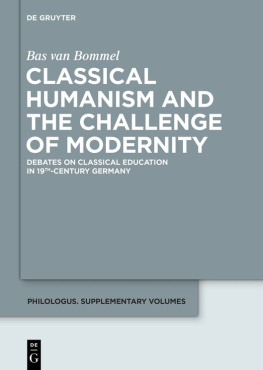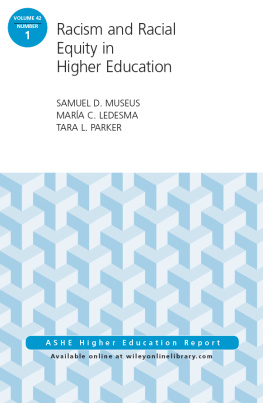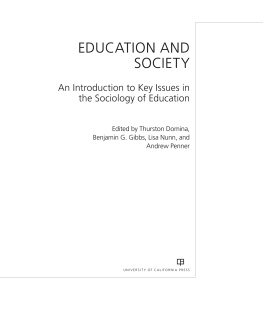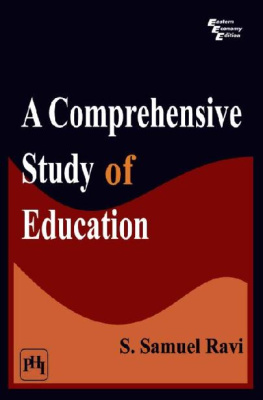Samuel R. H. - Education Society in Modern Germany
Here you can read online Samuel R. H. - Education Society in Modern Germany full text of the book (entire story) in english for free. Download pdf and epub, get meaning, cover and reviews about this ebook. year: 2013, publisher: Routledge, genre: Religion. Description of the work, (preface) as well as reviews are available. Best literature library LitArk.com created for fans of good reading and offers a wide selection of genres:
Romance novel
Science fiction
Adventure
Detective
Science
History
Home and family
Prose
Art
Politics
Computer
Non-fiction
Religion
Business
Children
Humor
Choose a favorite category and find really read worthwhile books. Enjoy immersion in the world of imagination, feel the emotions of the characters or learn something new for yourself, make an fascinating discovery.

- Book:Education Society in Modern Germany
- Author:
- Publisher:Routledge
- Genre:
- Year:2013
- Rating:3 / 5
- Favourites:Add to favourites
- Your mark:
- 60
- 1
- 2
- 3
- 4
- 5
Education Society in Modern Germany: summary, description and annotation
We offer to read an annotation, description, summary or preface (depends on what the author of the book "Education Society in Modern Germany" wrote himself). If you haven't found the necessary information about the book — write in the comments, we will try to find it.
Education Society in Modern Germany — read online for free the complete book (whole text) full work
Below is the text of the book, divided by pages. System saving the place of the last page read, allows you to conveniently read the book "Education Society in Modern Germany" online for free, without having to search again every time where you left off. Put a bookmark, and you can go to the page where you finished reading at any time.
Font size:
Interval:
Bookmark:


| I | Adolescent Girls in Approved Schools | Richardson |
| II | Adult Education | Peers |
| III | Down Stream | Dale et al |
| IV | Education after School | Stimson |
| V | Education and Society | Ottaway |
| VI | Education and Society in Modern France | Fraser |
| VII | Education and Society in Modern Germany | Samuel et al |
| VIII | Education and the Handicapped 1760 - 1960 | Pritchard |
| IX | Education in Israel | Bentwich |
| X | Education in Transition | Dent |
| XI | The Education of the Countryman | Burton |
| XII | The Educational Thought and Influence of Matthew Arnold | Connell |
| XIII | English Primary Education - Part One | Blyth |
| XIV | English Primary Education - Part Two | Blyth |
| XV | From School to University | Dale |
| XVI | Helvetius | Cumming |
| XVII | Mission of the University | Ortega y Gasset |
| XVIII | Parity and Prestige in English Secondary Education | Banks |
| XIX | Problems in Education | Holmes |
| XX | The School Inspector | Edmonds |
| XXI | Sixth Form and College Entrance | Morris |
| XXII | Social Class and the Comprehensive School | Ford |
| XXIII | The Social Psychology of Education | Fleming |
| XXIV | The Social Purposes of Education | Collier |
| XXV | Social Relations in a Secondary School | Hargreaves |
| XXVI | Total Education | Jacks |
| XXVII | Values and Involvement in a Grammar School | King |
| XXVIII | Who shall be Educated? | Warner et al |
Routledge
Routledge
2 Park Square, Milton Park, Abingdon, Oxon, OX14 4RN
A CIP catalogue record for this book is available from the British Library
ISBN 0-415-17756-1
The Sociology of Education: 28 Volumes
ISBN 0-415-17833-9
The International Library of Sociology: 274 Volumes
ISBN 0-415-17838-X
The publisher has gone to great lengths to ensure the quality of this reprint but points out that some imperfections in the original may be apparent
R.H.T.
Introduction and Background
Font size:
Interval:
Bookmark:
Similar books «Education Society in Modern Germany»
Look at similar books to Education Society in Modern Germany. We have selected literature similar in name and meaning in the hope of providing readers with more options to find new, interesting, not yet read works.
Discussion, reviews of the book Education Society in Modern Germany and just readers' own opinions. Leave your comments, write what you think about the work, its meaning or the main characters. Specify what exactly you liked and what you didn't like, and why you think so.







